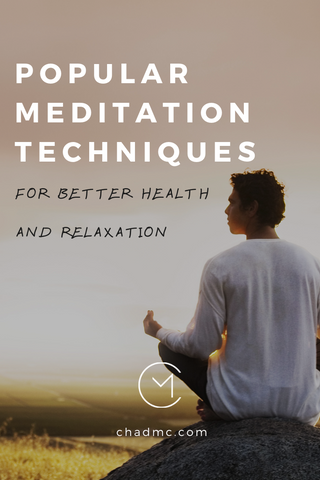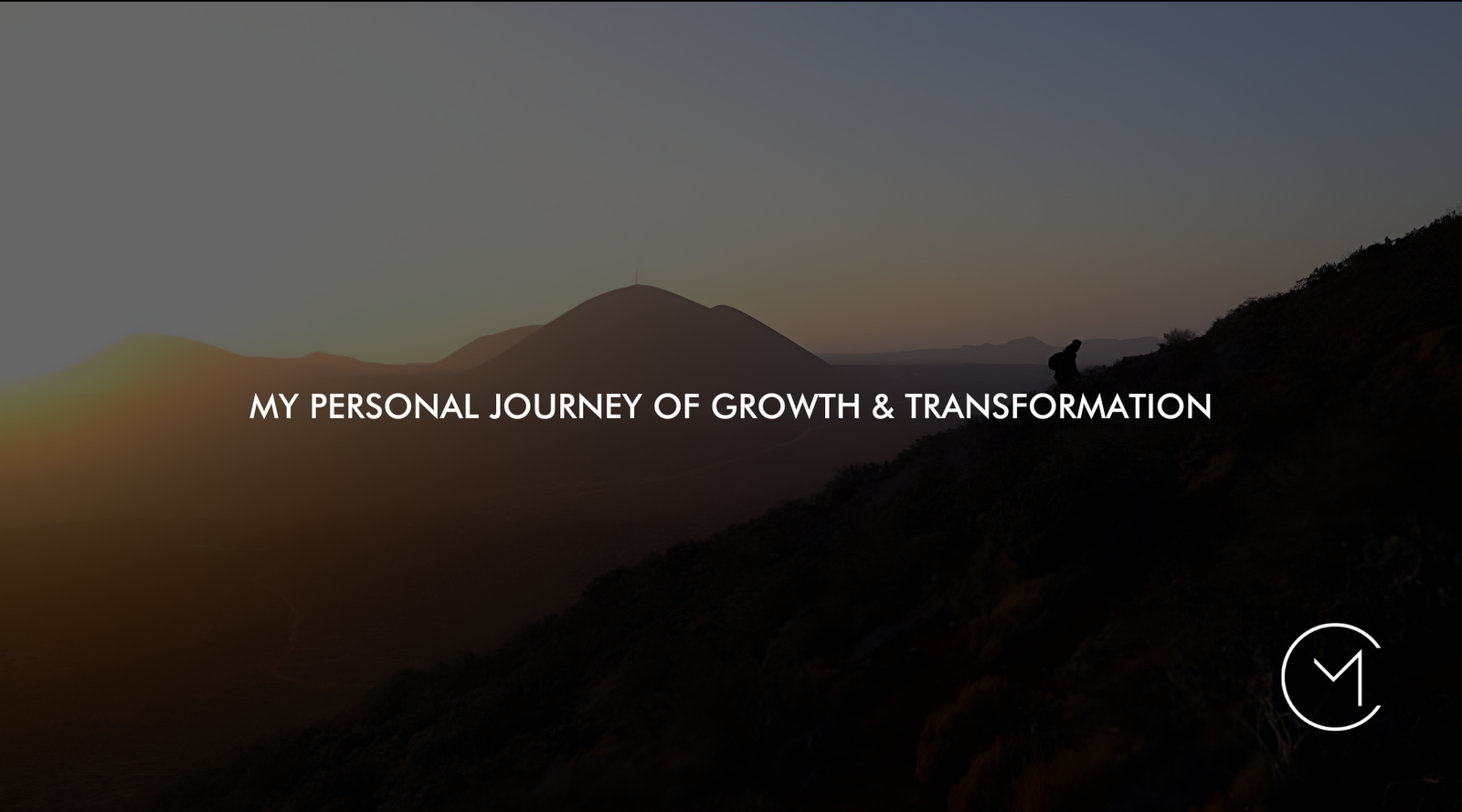Your Cart is Empty
Add description, images, menus and links to your mega menu
Add description, images, menus and links to your mega menu
9 Popular Meditation Techniques for Better Health and Relaxation

Relax your mind, settle your soul, clarify your intentions, and manifest your reality.
Meditating to bring calm and ease to our thoughts is a beneficial exercise that we can all do. Whether you're a newbie or seasoned pro, proper meditation brings clarity, focus, and can elevate your mood.
Have you ever had a problem that you had no idea how to solve, and as soon as you relaxed and got into a happier state, the solution came to you?

Nothing feels better than a bright, focussed mind and meditation can get you there. It's incredible how powerful and effective we can be when we feel clear headed.
Not to mention, often, the challenges we face have much simpler solutions than we realize. Meditation offers your brain the much-needed space to reconnect and replenish.
The question is, what should a beginner know to get started?
"Meditation is not an activity in which you can succeed or fail; It is not a skill that can be mastered, but rather, a process that we undergo, and everything that we experience in meditation is a result of undergoing that process ... simply put, by standing in the sun, you get warmed," explains Joshua Pollock (Meditation Trainer and co-author ofThe Heartfulness Way).

What is meditation?
Ultimately, anything we do that releases us from the bondage of overthinking can become an act of peaceful contemplation. Throughout our daily activities, we can be in meditation; even while sleeping, we meditate, explains Pollock.
How can we achieve alasting meditative state in our everyday life?
"We have to trigger it somehow, and this is what we achieve through the daily act of meditation, where we sit in both inner and outer stillness," explains Pollock.
It's a great start to understand what meditation is, but it's another thing to put it into regular practice. To get you started, here on some popular meditation techniques for better health and relaxation.

-
Guided Meditation
You might appreciate Guided Meditation if you find that you're a visual person who naturally enjoys imagination.
Guided Meditation (aka Guided Imagery or Visualization) allows you to meditate by forming mental pictures of situations that you find soothing.
For instance, maybe you feel relaxed and connected while you're on a tropical beach with warm, golden colored sand below you and crystal clear skies above you. Choose a situation that easily kicks your emotional bliss into gear.
How to get started with Guided Meditation?
Have a look online (or on your phone's app store) for Guided Meditations that appeal to you. Generally, they are led by a teacher and often use your senses to entice you into a relaxed state.
Try a Guided Meditation as you fall asleep to experience deeper rest.

-
Metta Meditation (Loving Kindness Meditation)
Metta Meditation is the heartfelt practice of directing loving, positive vibes toward others.
According toMedical News Today(an authoritative website on medical and health news), those who do this meditation tap into feelings of love by reciting specific heart-warming sentences.
Who is this technique good for?
Of course, anyone can benefit from tapping into love, but Metta Meditation can substantially help those who struggle with:
- frustration
- resentment
- interpersonal conflict
- anger
How to get started with Metta Meditation?
- Sit down somewhere that you feel safe, supported, and comfortable.
- Take some deep breaths to calm and focus your mind.
- Slowly and steadily say, "May I be happy," "May I be safe," "May I be peaceful and at ease."
- After you warm up your feelings of love by directing kindness toward yourself, repeat the mantra, but replace "I" with "you."
- You can think of anyone you wish and can change it each time. You might want to focus on friends or family members that bring a lot of love into your life.
- As time goes on and you become more experienced with this type of meditation, feel free to focus love and wishes of warmth on people who can be difficult.
- As you finish this popular meditation technique, end it with the mantra, "May all beings everywhere be happy."

-
Body Scan Meditation
Body Scan Meditation encourages you to scan your body for areas that feel tense. The end goal? When you discover a spot of tension, you are aware and can release it.
There are different kinds of Body Scan Meditations. In some, you tense and relax muscles, while in other practices you imagine a soothing wave that drifts over your body releasing tension.
Body scanning is excellent because it puts you in touch with your mind, emotions, and physical senses. It can improve your feeling of calmness and relaxation, explainsMedical News Today.
How to get started with Body Scan Meditation?
Seek out a meditation online that will guide you through releasing your body's tension.
Start at one end of your body (such as your feet) and gradually work through each part until you feel cool as a cucumber.

-
Transcendental Meditation
With Transcendental Meditation, the result is that your emotions release and rise above any current situation or mindset that might be hindering you.
How does Transcendental Meditation work?
During your meditation session, you focus on and repeat a mantra or word. For instance, you might repeat "I am a confident driver," or "I am not afraid of flying." Usually, your meditation teacher will choose the mantra for you.
Those who have practiced Transcendental Meditation successfully have reported increased mindfulness, as well as spiritual experiences, notesMedical News Today.

-
Mindfulness Meditation
Dwelling on past situations isn't fun or healthy for anyone. We can't go back and change the past, but we can gain a better hold on our present by letting go of times that no longer serve us.
Instead of dwelling on moments from the past or feeling fear for the future, mindfulness promotes your ability to befully present.
Let's say that you are at a restaurant when an ex-flame comes in. You might be tempted to spiral into thoughts of 'what ifs.' But with Mindfulness Meditation, you can experience the moment fully without judgment. Of course, it takes practice and time to reach a place where you can stay calm and grounded in an uncomfortable situation.
Research has shown that mindfulness can:
- improve your focus
- boost your memory
- lessen impulsive (or overly emotional) reactions
- enhance your feeling of satisfaction in relationships

-
Zazen Meditation (Zen Meditation)
Similar to Mindfulness Meditation, Zazen has you focus on your breath while observing your thoughts without judgment. Does this sound a little easier said than done?
Observing your thoughts free of criticism isn't the simplest task to ask of yourself. But to help you release your inner critic, it can be incredibly helpful to practice Zazen Meditation with an experienced teacher.
Those who practice this relaxation technique often choose to work with a guide because of the meditation's specific poses and movements. You may find that it's similar to Mindfulness Meditation, but is more involved and requires a touch more discipline and practice. But you’re up for the challenge, aren’t you?
Who is Zazen Meditation best for?
This meditation practice is best suited for spiritually inclined people who seek relaxation.

-
Movement Meditation
Unlike most meditation practices that have you sit still, Movement Meditation focuses on your body in action. Some examples of Movement Meditation practices are tai chi, yoga, and martial arts.
How does Movement Meditation work?
Once you begin to move and exercise, you might find that you feel connected to your body. Once you feel calm and present in your own skin, you can simply expand your awareness to other activities (such as walking your dog, hiking, or gardening).
You have most likely experienced a feeling of calm during activities that require a lot of focus before (such as surfing, snowboarding, or running); Movement Meditation is just a more focussed way to go about it.
Who is Movement Meditation best for?
Anyone who has trouble sitting for a long-time can happily enjoy this form of meditation.

-
Kundalini Meditation (Kundalini Yoga)
Kundalini is a physically active form of meditation that combines, mantras, deep breathing, and movements.
If it sounds a bit overwhelming, not to worry. It's suggested that as you begin Kundalini Yoga, you might want to work with a teacher to get you started on the right foot.
Like other forms of yoga, Kundalini Meditation can bring improvements to your strength and overall emotional well-being.
How to get started with Kundalini Meditation?
If you don't have a Kundalini Yoga Meditation Teacher in mind, look up some beginner meditational tips and get started in a cozy place.
Guru Rattana (Yoga Teacher who trained in Kundalini Yoga with Yogi Bhajan) offers the following tips on how to do a Kundalini Meditation:
- Sit comfortably with a straight, upright spine.
- Relax with your hands in your lap.
- Have the palms facing up.
- Rest your right hand over your left.
- Close your eyes and allow a little sliver of light to come in.
- Maintain loose shoulders with your chest slightly lifted.
- Concentrate on Your Breath
- Concentrate on the flow (and in and out) of your breath.
- Breathe through your nose.
- At first, notice your breath and how your body moves with each inhalation and exhalation.
- Slow your breathing down and listen to the sound of your breath.
- Clear Your Mind
- You may experience that your mind struggles with constant chatter. This is normal!
- You might find it super helpful to focus on a mantra.
- For instance, If you use Sat Nam, you can concentrate on "Sat" for the inhale and "Nam" for the exhale.
- This focus on the mantra will train your mind and release your subconscious from the badgering of persistent thoughts.
- Heighten Your Focus
- Allow your thoughts to flow in and out of your mind without attaching to them.
- Stay focussed on the flow and feeling of your breath.
- Continue for about ten minutes.
- To bring the meditation to an end, inhale and exhale deeply and stretch both arms toward the ceiling.
- Exhale, relax, and enjoy the feeling of peacefulness.

-
Bed Meditation
Ever had troubles falling asleep at night? Before you know it, 3 am approaches, and your stress increases, even more, knowing you have to be up to work in a couple of hours.
The frustrating cat and mouse game with sleep is not fun, but there are some meditation techniques that you can practice from the comfort of your bed to help you achieve a more restful night's sleep (which, of course, boosts your overall health!).
How to get started with a Bed Meditation?
Below are some simple meditation techniques to help you catch a solid night of shut-eye:
- While you are lying in bed, place your hands comfortably on your belly, and gently breath in and out, explains Kathy Doner (MD with a Hypnotherapy Practice).
- As you focus on the movement and feeling of your breathing, your mind calms down and can relax, says Doner.
- Deep abdominal breathing offers you an easy, simple, and effective way to improve your quality of rest.
- Count Down:
- As you are lying in your bed, allow your eyes to gaze upward towards the ceiling. The slight strain can relax you, explains Doner.
- Begin the meditation by breathing deeply.
- After, imagine that you are walking downstairs while counting down from 20. You might want to do repeat counting down a few times until you feel sufficiently soothed.
- To help you count down, you can weave in some visualization and imagery.
For example, maybe you are walking down an ivory set of stairs into a lavishly decorated room that's perfect for a good night's rest.
Feel free to work in a few popular meditation techniques to achieve the Zen-like state you're craving and so deserve!
- Bed-Time Prayer:
- You don't need to be religious to pray. Instead of your minds going wild at night, a simple prayer can help you feel a sense of ease.
A Prayer Meditation "Helps us to convert our sleeping state into a state of yogic sleep known as yoganidra, allowing us to utilize all 24 hours of the day for our evolution," explains Pollock.

Now that you have all of these popular meditation techniques in your back pocket, you might be wondering how long it takes for meditation to work?
As a general rule, try to avoid focussing on the result and stay centered on being present in the moment. And within a short time, many experience positive health benefits quite quickly, notesMedical News Today.
What kind of positive health benefits can you experience from meditation?
You can experience:
- increased confidence
- clarity of thought
- deeper breathing
- a feeling of positivity
- better sleep
- reduction of anxiety
Do you need an experienced teacher to receive the full benefits from meditation?
Like anything, you can begin where you are and do your best. The goal isn't to win or achieve, but to experience the health benefits from clearing your mind.
With that in mind, "Most meditation techniques are best given in person by a trainer ... some pursuits simply require teachers and meditation is one such pursuit," says Pollock.
If you enjoyed this post and are excited to dive into a Zen-like state of mind, why not enhance your practice with the soothing addition of essential oils from our aromatherapy collection?
Sources:
https://ggia.berkeley.edu/practice/loving_kindness_meditation#data-tab-why_you_should_try_it
http://onlinelibrary.wiley.com/doi/10.1002/jts.21832/full
https://www.yogajournal.com/meditation/deepak-chopras-7-step-meditation-to-open-your-heart
Mindfulness Research: http://www.apa.org/monitor/2012/07-08/ce-corner.aspx
http://www.kundaliniyoga.org/Meditation
https://mindworks.org/blog/different-types-meditation-technique/
https://www.everydayhealth.com/meditation/tpes/
CONTRIBUTORS
Tess Bercan
Tess is high vibrating digital nomad, trendspotter, and contributing guest writer at Chadmc.com. Along her journey she's written for Spirit Guides Magazine, Elephant Journal, International Living, and Go, Nomad, among many others, and I'm thrilled to have her on our team. Connect with her directly @TessBercan on Twitter, anytime.
Joshua Pollock
JOSHUA POLLOCK is a Heartfulness trainer and practitioner from the United States. Pollock is a dedicated spiritual aspirant, and is enthusiastic about sharing his passion for meditation, frequently lecturing at private seminars, holding practical demonstrations in corporate, educational and governmental settings, and providing ongoing individual support to local seekers. Learn more about mindfulness with his book, "The Heartfulness Way."
Chad McMillan
Chad McMillan is an awoke venture capitalist and creative artist, having spent some 15 years building and financing startup companies. With a deep passion for positive social impacts, the creative arts, lifestyle trends, and conscious living, he now shares everything he knows, loves, and is interested in with you here.
Chad McMillan
Chad McMillan is an independent venture capitalist and creative artist focused on personal growth and exponential entrepreneurship. Connect with Chad at chad@chadmc.com.
Leave a comment
Comments will be approved before showing up.
Also in Chad McMillan's Growth Focused Blog

My Journey
Many of you here might not yet know much about who I am, some of my life experiences, and why I may have anything of value to add to the conversation around the topics I'm exploring. Learn more about me in this post as I share who I am, and some of the wild ride I've been on thus far...

For Love & Money

Improve Mental Health & Wellness
Improving our mental health can have profound and lasting impacts on our lives, the lives of those around us, and our communities. In Canada, it is estimated that 20% of Canadians experience problems with their mental health in any given year, and half of the population has faced some level of mental health issues by the time they turn 40. In this post I share tips and strategies that I've used over the years to improve my own mental health, which I feel may help you on your journey as well.






